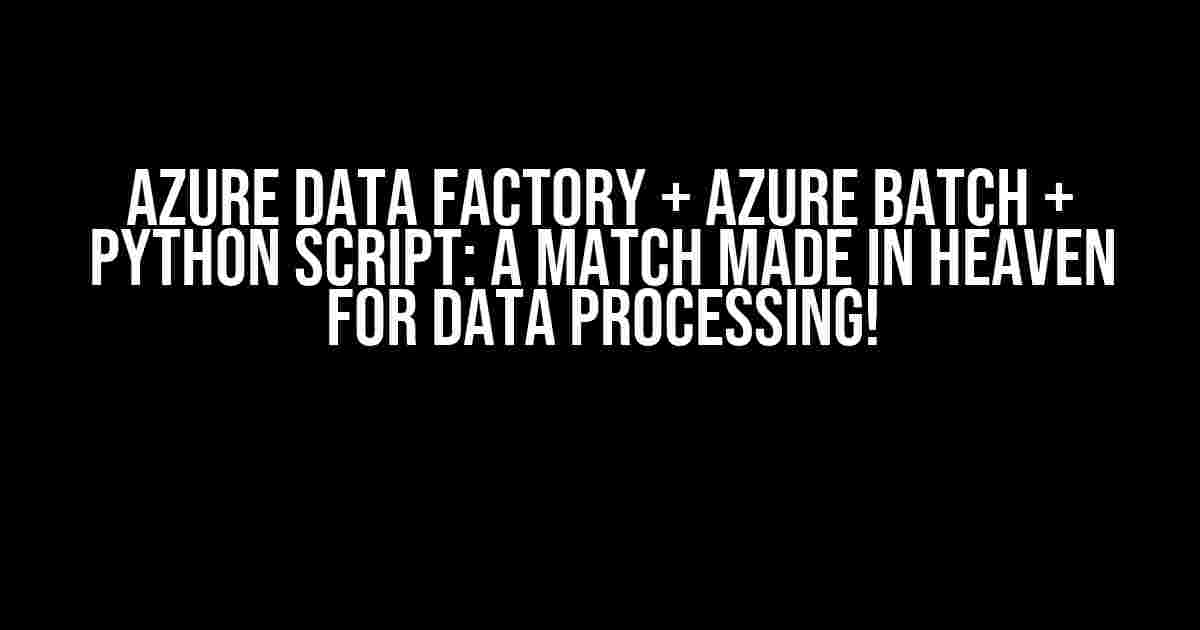Are you tired of dealing with slow and inefficient data processing pipelines? Do you wish you had a way to seamlessly integrate your data processing tasks with scalable and on-demand computing power? Look no further! In this article, we’ll explore the ultimate combo of Azure Data Factory, Azure Batch, and Python Script, and show you how to harness their collective power to revolutionize your data processing workflows.
What is Azure Data Factory?
Azure Data Factory (ADF) is a cloud-based data integration service that allows you to create, schedule, and manage data pipelines across different sources and destinations. With ADF, you can integrate disparate data sources, transform and process data, and load it into target systems for analytics and reporting. ADF provides a robust and scalable platform for data processing, making it an ideal choice for organizations dealing with large volumes of data.
What is Azure Batch?
Azure Batch is a cloud-based service that enables you to run large-scale parallel and high-performance computing (HPC) workloads in the cloud. With Azure Batch, you can create pools of virtual machines, schedule jobs, and execute tasks in parallel, making it an ideal choice for computationally intensive workloads. Azure Batch provides a scalable and on-demand computing infrastructure, allowing you to process large datasets quickly and efficiently.
What is Python Script?
Python is a popular programming language known for its simplicity, flexibility, and ease of use. In the context of Azure Data Factory and Azure Batch, Python scripts can be used to create custom data processing tasks, such as data transformations, data quality checks, and data validation. Python scripts can be executed as part of an ADF pipeline, allowing you to inject custom logic and intelligence into your data processing workflows.
The Perfect Marriage: Azure Data Factory + Azure Batch + Python Script
So, what happens when you combine the data integration capabilities of Azure Data Factory, the scalable computing power of Azure Batch, and the customizability of Python scripts? You get a match made in heaven for data processing! With this combo, you can create powerful data processing pipelines that can handle large volumes of data, execute computationally intensive tasks, and inject custom logic and intelligence into your workflows.
Use Case: Data Processing Pipeline
Let’s consider a real-world scenario where we need to process large volumes of customer data from multiple sources, transform and cleanse the data, and load it into a target database for analytics. We’ll use Azure Data Factory to create a data pipeline, Azure Batch to execute computationally intensive tasks, and Python scripts to inject custom logic and intelligence into our pipeline.
Step 1: Create an Azure Data Factory Pipeline
Create a new Azure Data Factory pipeline and add the following components:
- A Azure Blob Storage dataset as the source dataset
- A Azure SQL Database dataset as the target dataset
- A Python script activity to execute a data transformation task
- A Azure Batch activity to execute a computationally intensive task
Step 2: Create a Python Script Activity
Create a Python script activity in your ADF pipeline that executes a data transformation task. For example, you can use the following Python script to convert customer data from CSV to JSON format:
import pandas as pd
from io import StringIO
# Load the CSV file
csv_data = pd.read_csv('https://example.blob.core.windows.net/data/customer_data.csv')
# Convert the CSV data to JSON
json_data = csv_data.to_json(orient='records')
# Write the JSON data to a file
with open('customer_data.json', 'w') as f:
f.write(json_data)
Step 3: Create an Azure Batch Activity
Create an Azure Batch activity in your ADF pipeline that executes a computationally intensive task. For example, you can use the following Azure Batch task to execute a data validation task using a Python script:
import os
import sys
from datetime import datetime
# Get the input file from Azure Blob Storage
input_file = os.environ['INPUT_FILE']
# Execute the data validation task
if validate_data(input_file):
print('Data validation successful!')
else:
print('Data validation failed!')
sys.exit(1)
# Upload the output file to Azure Blob Storage
output_file = os.environ['OUTPUT_FILE']
with open(output_file, 'w') as f:
f.write('Data validation successful!')
Step 4: Execute the Pipeline
Execute the ADF pipeline and monitor the progress of the pipeline. The Python script activity will execute the data transformation task, and the Azure Batch activity will execute the computationally intensive task. Once the pipeline is complete, you can verify the output files in Azure Blob Storage.
| Component | Description |
|---|---|
| Azure Data Factory | Data integration service |
| Azure Batch | Scalable computing power |
| Python Script | Custom data processing logic |
Benefits of Using Azure Data Factory + Azure Batch + Python Script
By combining Azure Data Factory, Azure Batch, and Python scripts, you can create powerful data processing pipelines that offer the following benefits:
- Scalability: Azure Batch provides scalable computing power to handle large volumes of data.
- Flexibility: Python scripts can be used to inject custom logic and intelligence into your data processing workflows.
- Reliability: Azure Data Factory provides a robust and reliable platform for data integration and processing.
- Cost-effectiveness: Azure Batch provides a cost-effective solution for computationally intensive tasks, allowing you to pay only for the computing resources you need.
- Security: Azure Data Factory and Azure Batch provide a secure and compliant platform for data processing and storage.
Conclusion
In this article, we’ve explored the ultimate combo of Azure Data Factory, Azure Batch, and Python scripts, and shown you how to harness their collective power to revolutionize your data processing workflows. By combining the data integration capabilities of Azure Data Factory, the scalable computing power of Azure Batch, and the customizability of Python scripts, you can create powerful data processing pipelines that can handle large volumes of data, execute computationally intensive tasks, and inject custom logic and intelligence into your workflows. So, what are you waiting for? Get started with Azure Data Factory, Azure Batch, and Python scripts today, and take your data processing to the next level!
Keywords: Azure Data Factory, Azure Batch, Python Script, Data Processing, Scalability, Flexibility, Reliability, Cost-effectiveness, Security.
Frequently Asked Questions
Get ready to level up your Azure Data Factory and Azure Batch skills with Python scripting! Here are some frequently asked questions to get you started:
What is the main benefit of using Azure Data Factory with Azure Batch?
By combining Azure Data Factory (ADF) with Azure Batch, you can efficiently process large-scale data pipelines with high-performance computing. ADF handles data orchestration, while Azure Batch provides the power to run compute-intensive tasks, making it perfect for data scientists and engineers who need to process massive datasets!
How does Azure Batch integrate with Python scripting?
Azure Batch allows you to run Python scripts as tasks, making it easy to execute data processing, machine learning, and other compute-intensive workloads. You can package your Python script as a ZIP file and upload it to Azure Batch, which will then execute it on a scalable cluster of virtual machines!
Can I use Azure Data Factory to trigger Azure Batch tasks?
Yes, you can! Azure Data Factory provides a built-in Azure Batch activity that allows you to trigger Azure Batch tasks as part of your data pipeline. This integration enables you to automate complex data processing workflows, making it easy to orchestrate large-scale data processing tasks!
What kind of data processing tasks can I run on Azure Batch with Python?
The possibilities are endless! With Azure Batch and Python, you can run a wide range of data processing tasks, such as data cleansing, data transformation, machine learning model training, and data visualization. You can even use popular Python libraries like Pandas, NumPy, and scikit-learn to build custom data processing tasks!
How do I monitor and debug my Azure Batch tasks running Python scripts?
Azure Batch provides detailed logging and monitoring capabilities, allowing you to track the progress of your tasks and debug any issues that arise. You can also use Azure Batch’s built-in support for Python logging frameworks like logging and Loggly to monitor and troubleshoot your Python scripts!








